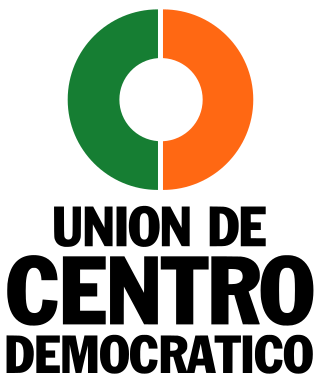Related Research Articles
A coalition government is a government where political parties enter a power-sharing arrangement of the executive. Coalition governments usually occur when no single party has achieved an absolute majority after an election. A party not having majority is common under proportional representation, but not in nations with majoritarian electoral systems.

Liberal International (LI) is a worldwide organization of liberal political parties. The political international was founded in Oxford in 1947 and has become the pre-eminent network for liberal parties aiming to strengthen liberalism around the world. Its headquarters are at 1 Whitehall Place, London, SW1A 2HD, within the National Liberal Club. The Oxford Manifesto describes the basic political principles of the Liberal International, which is currently made up of 111 parties and organizations.

The Colombian Liberal Party is a centre to centre-left political party in Colombia. It was founded as a classical liberal party but later developed a more social-democratic tradition, joining the Socialist International in 1999.
An electoral alliance is an association of political parties or individuals that exists solely to stand in elections.
This article gives information on liberalism worldwide. It is an overview of parties that adhere to some form of liberalism and is therefore a list of liberal parties around the world.
This article gives an overview of liberalism and radicalism in Spain. It is limited to liberal and radical parties with substantial support, mainly proved by having been represented in parliament. The sign ⇒ denotes another party in that scheme. For inclusion in this scheme it is not necessary that parties label themselves as a liberal or radical party.

The Colombian Conservative Party is a conservative political party in Colombia. The party was formally established in 1849 by Mariano Ospina Rodríguez and José Eusebio Caro.

The Union of the Democratic Centre was an electoral alliance, and later political party, in Spain, existing from 1977 to 1983. It was initially led by Adolfo Suárez.

Democratic and Social Centre was a liberal political party in Spain, founded in 1982 by former Prime Minister Adolfo Suárez. The party was a member of the Liberal Democratic and Reformist Group in the European Parliament and the Liberal International. In 2006, most of its remaining members merged into the People's Party, though a reduced faction continued the party, which won some seats in the 2007 local elections.

The Union Party for the People, or Party of the U, is a liberal political party in Colombia. The Party is led by former president Juan Manuel Santos.

The Thousand Days' War was a civil war fought in Colombia from 17 October 1899 to 21 November 1902, at first between the Liberal Party and the government led by the National Party, and later – after the Conservative Party had ousted the National Party – between the liberals and the conservative government. Caused by the longstanding ideological tug-of-war of federalism versus centralism between the liberals, conservatives, and nationalists of Colombia following the implementation of the Constitution of 1886 and the political process known as the Regeneración, tensions ran high after the presidential election of 1898, and on 17 October 1899, official insurrection against the national government was announced by members of the Liberal Party in the Department of Santander. Hostilities did not begin until the 11th of November, when liberal factions attempted to take over the city of Bucaramanga, leading to active warfare. It would end three years later with the signing of the Treaty of Neerlandia and the Treaty of Wisconsin. The war resulted in a Conservative victory, and ensured the continued dominance of the Conservative Party in Colombian politics for another 28 years. Colombia's political structure as a unitary state has not been challenged since.

The Glorious Revolution took place in Spain in 1868, resulting in the deposition of Queen Isabella II. The success of the revolution marked the beginning of the Sexenio Democrático with the installment of a provisional government.
Citizens, officially Citizens–Party of the Citizenry, is a liberal political party in Spain.

The Liberal Party was a liberal political party in Spain founded in 1976.
National Front was a period in the history of Colombia in which the two main political parties, the Liberal Party and the Conservative Party, agreed to rotate power, intercalating for a period of four presidential terms. The National Front Presidents were Alberto Lleras Camargo (Liberal), Guillermo León Valencia (Conservative), Carlos Lleras Restrepo (Liberal), and Misael Pastrana Borrero (Conservative).
The Liberal Party, originally called Liberal Fusionist Party until 1885, was a Spanish political party created in 1880 by Práxedes Mateo Sagasta. With the Conservative Party of Antonio Cánovas del Castillo, it formed a two-party system of alternating governments, the turno, which characterised the Spanish Restoration during the late 19th century and the early 20th century.
The Liberal Conservative Party, also known more simply as the Conservative Party, was a Spanish political party founded in 1876 by Antonio Cánovas del Castillo.
The Moderate Party or Moderate Liberal Party was one of the two Spanish political parties that contended for power during the reign of Isabel II. Like the opposing Progressive Party, it characterised itself as liberal and dynasticist; both parties supported Isabel against the claims of the Carlists.
Centrism is a political outlook or position involving acceptance or support of a balance of social equality and a degree of social hierarchy while opposing political changes that would result in a significant shift of society strongly to the left or the right.

The People's Coalition was a Spanish political coalition comprising national and regional right-wing parties to contest various general, regional and municipal elections between 1983 and 1987.
References
- ↑ "Liberales (y Progresistas) (1868-1931)". Historia Electoral.com (in Spanish). Retrieved 23 April 2023.